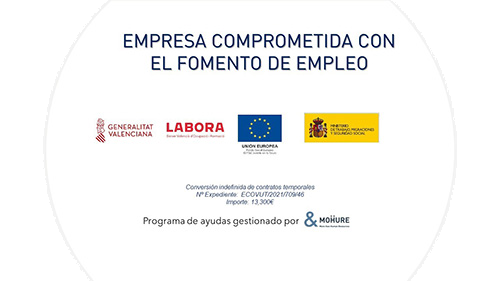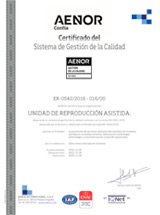The XVI of the master that is imparted in the HLA Hospital Vistahermosa, closes with the delivery of diplomas and the conference of the president of the Spanish Society of Fertility on the “Present paper of the Preliminary Genetic Screening”
The high formative quality places this program as a national and international benchmark that has placed 80% of its previous students in different work teams
 The Master of Reproductive Biology and Genetics closed its sixteenth edition on June 9th by launching a dozen national and international specialists in reproductive medicine, biology and genetics to the professional market. Organized by the Reproductive Biomedicine Chair of the Miguel Hernández University and the Reproduction and Genetics Units of the HLA Vistahermosa Hospital, it includes a series of lectures on “Controversies in Reproduction” given by a group of professionals, scientists and researchers from the best Spanish centers And international.
The Master of Reproductive Biology and Genetics closed its sixteenth edition on June 9th by launching a dozen national and international specialists in reproductive medicine, biology and genetics to the professional market. Organized by the Reproductive Biomedicine Chair of the Miguel Hernández University and the Reproduction and Genetics Units of the HLA Vistahermosa Hospital, it includes a series of lectures on “Controversies in Reproduction” given by a group of professionals, scientists and researchers from the best Spanish centers And international.
The director of the Reproduction Unit and director of the Chair, Dr. José López Gálvez, pointed out the high demand that this
A University Specialist in Biology of Reproduction, which has a limited number of 10 students, interested in specializing in one of the emerging areas with the future of current medicine, “which puts in value its teaching quality and places it as a National and international reference “. For his part, the director of the Genetics Unit and academic director, Dr. Joaquín Rueda, indicated that “80% of students from previous editions are now part of different work teams.”
The president of the Spanish Fertility Society (SEF), Agustín Ballester, gave a closing lecture on the advantages offered by the Preimplantation Genetic Screening, that is, the genetic study of the embryo before its implantation in the maternal uterus. This study detects the genetic or chromosomal abnormalities of the embryo and is indicated mainly in cases of repetitive abortions in spontaneous pregnancies or after in vitro fertilization (IVF), as well as in implantation failures after several cycles of IVF with good quality embryos and Without any apparent cause.
Ballester explained that “this is a technique that has not always been well considered by the level of demand and complexity”; However, he argues that “its realization does not cause harm to the embryo and the results are very good even in conflicting indications that are given in case of elderly women.”
The president of the SEF stressed that “embryonic selection not only improves clinical outcomes, but reduces the emotional cost of patients as it reduces the risk and attempts to achieve an evolutionary pregnancy.” He stressed that “there is no point in considering it as experimental nowadays, since the evidences of its efficacy, safety and usefulness are more than justified; Is used worldwide and is endorsed by a vast experience. ” The problem, argues the specialist, is that it needs a change of law, so he said that “since the SEF is working to get it.”










